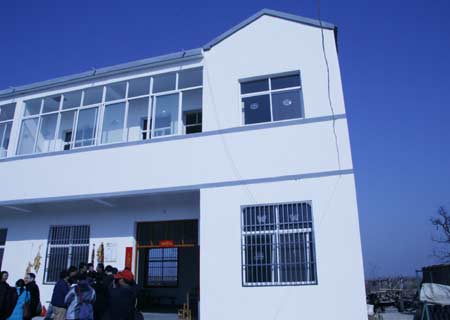Dividing up the land helped Guan's fellow farmers feed their families. The village was the first in China to implement the household responsibility system, under which land was leased to families in return for delivery of fixed output quotas. In less than a year, villagers increased output by more than enough to meet their own needs and had accumulated a surplus for sale on the market.
According to the village committee, grain output increased to 90,000 kilograms in 1979, six times as much as the previous year. The per capita income of Xiaogang climbed from 22 yuan to 400 yuan.
In the next a few years, the remarkable gains in Xiaogang turned this tiny mid-China village into a national model and many other places copied their example in breaking up the communes – the single greatest step toward today's market-oriented economy. From then on, the whole country started out on the road to reform. It began with agriculture, but industry followed.
Today, China's economy is the fourth largest in the world and in 30 years of reform the country's gross domestic product has grown by more than 9 percent a year.
Guan said: "Before, farmers were happy if they had a meal a day. Now they have three – and sometimes a drink too."
Xiaogang was not the only place whose visionary "law-breaking" set the country on the path to economic growth, but it was the most famous. People called it the "Model Village".
 |
|
Guan spent 80,000 yuan or $17,820 building his new two-floor house in 2008. (China.org.cn / WANG Ke)
|
Land leasing, small industries and tourism to handle challenges
In historical perspective, the responsibility system not only liberated the productive forces, but also established two basic principles of China's reform program; to rely on the people's own initiative, and to judge the success or failure of a reform by whether it improved living standards.
Allocating farmland to individual households gave farmers incentives that had been dampened in the planned economy. The 1980s were a golden period of development in China's rural areas, which for once outperformed their urban peers.
But since the 1990s, rural areas have been losing their luster, and have lost huge amounts of resources, above all their labor force, to the cities.
Located on the banks of the Huaihe River, which is haunted by frequent floods, Xiaogang village lacks the resources to develop without outside assistance. Even as the pioneer of China's rural reform, it soon ran into difficulties. Dividing the farmland helped the villagers feed themselves but it could not make them rich.
When President Hu Jintao last September put forward a new plan for land reform, in which farmers would be allowed to lease their land for cash, he went to Xiaogang to promote the new policy. Once again, practice preceded theory – Guan had already leased his 0.6 hectares of farmland to a flower planting company from Henan Province for an annual rent of 5,000 yuan ($625).